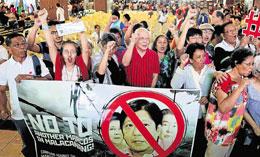Torture victims vow to derail son’s ambitions

There was nothing safe about the “safehouse” in Pasig, Philippines where during the early Marcos Martial Law years, then teacher Loretta Ann “Etta” Rosales and her five companions were brought to.
It was in this place where Rosales, who would later head the Commission on Human Rights, was interrogated and tortured for a month by her captors - military agents who turned out to be her students at the Jose Rizal College.
Rosales was electrocuted and sexually abused. Hot candle wax was also poured on her skin and a wet cloth was used to suffocate her, according to her published testimony.
Despite her anguish, Rosales says she never thought that it would already be her end. “I wasn’t thinking of dying, I was fighting for life.”
Domiciano Amparo was one of five persons arrested by government troops in the Mountain Province town of Sagada in 1984. Buried up to his chest in the ground, his captors stomped on him, kicked his face until he lost all feeling there, rode him like a horse, made ashtrays of his shoulders until, feeling he would no longer make it, he was advised to “pray, pray all the prayers you know, your time has come …”
These are just some of the stories that have emerged over the years about the brutal era under Ferdinand Marcos when tens of thousands of Filipinos were tortured, imprisoned and killed.
Now, angry victims of the late dictator have vowed to derail his son’s vice-presidential bid as they demanded long-delayed retribution.
Hundreds who endured torture and imprisonment during Marcos’ two-decade reign gathered in Manila last week chanting “No More Marcos! Marcos Dictator!” as they announced plans to dog Ferdinand Marcos Jr.’s electoral effort.
“We will hound his campaign,” the group’s convenor, torture victim Bonifacio Ilagan told told media.
“He will redeem the family, rewrite history and bring back his father’s abusive leadership framework.”
Human rights groups say tens of thousands of people were murdered, tortured and imprisoned during Marcos’ tumultuous rule.
The government estimates Marcos and his family stole $10 billion from the already desperately-poor country during his rule.
The group Campaign Against the Return of the Marcoses to Malacanang or CARMMA, said Marcos Jr. was not the “guiltless son” that he claimed to be.
Opinion polls give Marcos Jr. — known as Bongbong — the lead in the vice-presidential race, three months before the May 9 general elections.
The president and vice president are elected separately in the Philippines, each serving a single six-year term.
The 58-year-old, an incumbent senator, denies his family stole from government coffers and insists his father’s rule was one of peace and progress.
Victory in the elections will cement a remarkable political comeback for the Marcos family, who held mostly local positions in their home provinces until Bongbong won a seat in the national Senate in 2010.
The family’s flamboyant matriarch, former first lady Imelda Marcos — who was famously found to have amassed hundreds of pairs of shoes while her husband was in power — has made no secret of her desire for her son to become president.
Marcos Jr. is trumpeting his father’s infrastructure achievements to a young electorate that has no firsthand experience of the brutality of martial law.
In a glossy Internet video, he proclaims “I am not my past. We are the future”.
The Marcos family fled to exile in Hawaii after being ousted by a military-backed popular revolt in 1986. Marcos Sr. died three years later.






